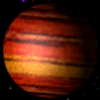Source
| Gas Giant | |
| Source (Beta Corvi IV) | |
|---|---|
 The Slylandro Homeworld | |
| Political | |
| Homeworld for | Slylandro |
| Astronomical data | |
| Star | Beta Corvi |
| Orbit | 8.04 a.u. |
| Atmosphere | Super Thick |
| Temperature | -156°C |
| Weather | Class 8 |
| Tectonics | None |
| Mass | 295.8 e.s. |
| Radius | 11.2 e.s. |
| Gravity | 2.35 g |
| Day length | 0.59 Earth days |
| Tilt | 5° |
| 1 satellite | |
| Satellite a | Urea World |
| Map | |
 | |
Source is the name the Slylandro have for their homeworld, the fourth planet in the Beta Corvi star system. It is the only known Gas Giant that has evolved life on it. Hundreds of species from all niches live on Source and one has even gained sentience: the Slylandro.
The Slylandro divide Source into three distinct regions: their world, the Depths, and Void. Their world consists of the 500 kilometer band of atmosphere where the Slylandro can survive with ease. Beneath their world lies the Depths where conditions become increasingly dark and hostile the deeper one goes. Descending into the Depths can be fatal as the increasing pressure will eventually rupture a Slylandro's gas bag. Young Slylandro, in a common feat of courage, will sink into the Depths just enough to damage but not rupture their gas bags, producing tissue scars on the gas bag which last for many rotations and are thought to make the Slylandro more attractive to potential mates. Any large scale constructions of tools or weapons are eventually dragged into the Depths by their own weight. Void lies above their world. Slylandro become giddy and behave inappropriately in the rarefied atmosphere of Void.
Slylandro time system
Source's rotation period is also the basis the Slylandro timekeeping system. Since the Slylandro lack any form of physical technology, this method of keeping time has persisted throughout the history of their race.
The principal unit of time in this system is the Drahn, equivalent to four million rotations of their home planet. A Drahn is sub-divided into two thousand Drahnasa. For even smaller periods of time, the Slylandro simply use the rotations of their homeworld as a unit of time. The following are approximate conversion factors between Slylandro and Human units of time:1
- 1 rotation = 14.2 Earth hours ≈ 0.592 Earth days
- 1 Dranhasa ≈ 1180 Earth days ≈ 3.24 Earth years
- 1 Drahn ≈ 2370000 Earth days ≈ 6480 Earth years
In discussions with the Slylandro, they consistently make reference to events using these units of time. When converted to conventional units of time, the timings of these events correspond fairly well with known historical findings — specifically, "3 Drahn ago" and "39 Drahn ago" yield nearly the same dates as the other sources indicate. The following table lists these events with the Slylandro time and corresponding Human time:
| Slylandro Time | Human Time | Event |
|---|---|---|
| a few hundred rotations | a few 59.2 days | time between visits of the Melnorme and The Captain |
| 500 rotations | 296 days | mission duration of Slylandro Probes |
| 1 Drahnasa | 3.24 years | time within which all The Captain's visits occur |
| half a Drahn | 3240 years | length of time over which the Slylandro had contact with the Sentient Milieu |
| 3 Drahn ago | 19400 years | regular visits from the Ur-Quan during the Sentient Milieu era |
| 3-4 Drahn | 19400-25900 years | estimated lifespan of a Slylandro |
| 39 Drahn ago | 253000 years | last visit from the 'Shaggy Ones' (the Precursors) |
| 41 Drahn ago | 266000 years | first contact from the 'Shaggy Ones' |
| many thousands of Drahn | many 6480000 years | historical extent of Slylandro species |
Notes and references
- 1Information about Source's rotation period and historical events was originally presented in this forum thread as Star Control II fact #3. These numbers come from data which was never intended to be shown in the game. As such, the numbers presented here may not have been intended and may actually be purely coincidental. Regardless, they fit with what we know from other sources about the Star Control Timeline.